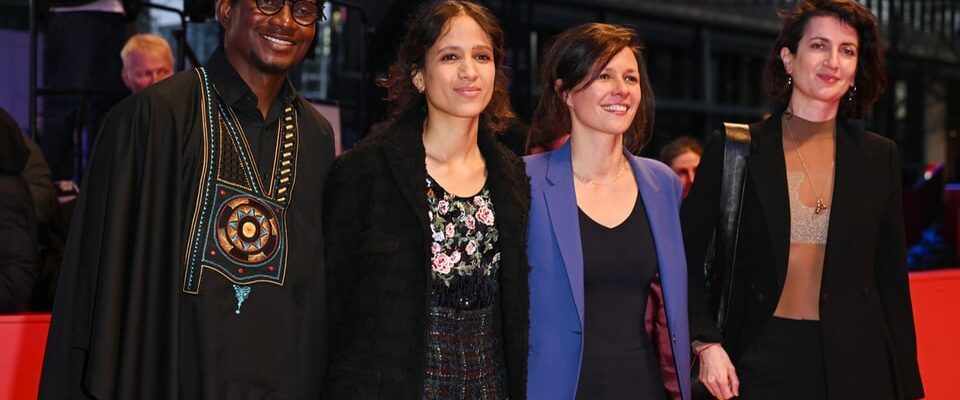Contents
In “Dahomey” the filmmaker Mati Diop deals with the return of art treasures stolen from Africa. The main prize of the 74th Berlinale goes to what is probably the shortest film in its history. A look back.
Mati Diop’s documentary “Dahomey” is barely over an hour long. With its final shots on the Atlantic beach of Benin, it looks in retrospect like the prologue to Diop’s feature film “Atlantique,” which won the Grand Jury Prize in Cannes in 2019.
The film revolves around France’s return of 26 statues and other works of art from the so-called Béhanzin Treasure, looted art from colonial times that were previously exhibited in the Paris Museum of Non-European Art on the Quai Branly.
One of these statues lets Mati Diop speak. Even in the opening credits, a magical voice tells of the robbery, transport and years in the dark.
Legend:
From left: Protagonist Gildas Adannou, director Mati Diop, and producers Eve Robin and Judith Lou Lévy win the “Golden Bear” at the Berlinale with the looted art documentary “Dahomey”.
KEYSTONE / DPA, Britta Pedersen
Prizes for works critical of colonialism
Statue number 26 does not speak in the official language of the former colony, not French. What you hear is lyrically haunting, even a little frightening. Diop doesn’t let the ghosts of the past rest, she summons them.
This triggers reflection on colonial deportation, on the theft of a culture and the losses that come with it. This becomes particularly clear in the second half of the film, in which students in Benin discuss the restitution campaign.
The Berlinale jury has therefore chosen one of the two works critical of colonial history from the 20 extremely different films in the competition.
For the other, the film “Pepe,” the wild story of the hippopotamuses kidnapped from Africa to South America from drug lord Pablo Escobar’s private zoo, the Dominican Nelson Carlos De Los Santos Arias received the jury’s directing award.
The Silver Bears
The Grand Jury Prize went to South Korea: The jury awarded the bizarre chamber play “Yeohaengjaui pilyo” (“A Traveler’s Needs”) by the South Korean veteran director Hong Sangsoo. The actress Isabelle Huppert plays an idiosyncratic French woman who wants to make a living as a language teacher in South Korea.
Meanwhile, German director Matthias Glasner received the Silver Bear for the best screenplay for his drama “Die”. The three-hour film is about the everyday life of a broken family.
This year, the jury was particularly impressed with his acting by the Romanian-US actor Sebastian Stan. He received the Silver Bear for his leading role in the tragicomedy “A Different Man”.
Great variety, not very noticeable
In terms of the diversity in the program and especially in the competition, this 74th Berlinale was impressive, but without particularly standing out as a year. The outgoing artistic director Carlo Chatrian is leaving the same way he came from the Locarno Film Festival five years ago: as a proven, globally networked specialist in auteur cinema.
However, he never really found his way into the role of host and thus also as a year-round drummer for the Berlinale in the German cultural policy jungle. But even so, the largest public film festival in the world once again attracted huge numbers from the population. This means that the Berlinale is still ahead of its globally and media-dominating European competitors Cannes and Venice.
The host will now be the American Tricia Tuttle from April.
